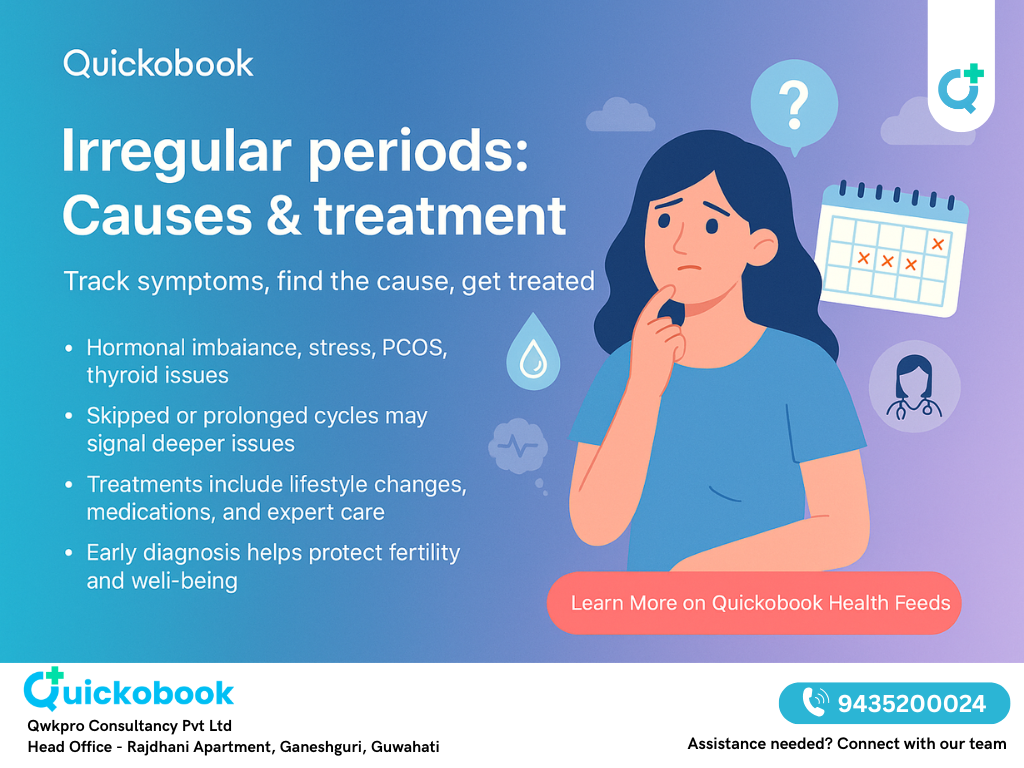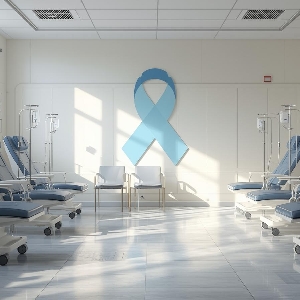Introduction
Irregular periods are one of the most common menstrual health concerns among women in India. While an occasional delay is normal, frequent irregularities may point to underlying conditions like PCOS (Polycystic Ovary Syndrome), thyroid disorders, or lifestyle-related factors. Identifying the causes and seeking timely treatment from a qualified gynaecologist can help prevent complications such as infertility, anaemia, and severe hormonal imbalance.
This blog explains the causes, diagnosis, and treatment options for irregular periods, along with practical lifestyle tips and FAQs tailored for Indian women.
What Are Irregular Periods?
An irregular period is when your menstrual cycle:
- Occurs earlier or later than the normal 21–35 days.
- Has unusually heavy or light bleeding.
- Is skipped altogether (missed periods).
- Involves spotting or bleeding between cycles.
Common Causes of Irregular Periods
1. PCOS (Polycystic Ovary Syndrome)
- A hormonal disorder where ovaries produce excess androgens.
- Leads to irregular or absent ovulation.
- Common in young women and linked to weight gain, acne, and infertility.
2. Hormonal Imbalance
- Fluctuations in estrogen and progesterone affect the menstrual cycle.
- Can result from puberty, perimenopause, or medical conditions.
3. Thyroid Disorders
- Hypothyroidism or hyperthyroidism can disrupt ovulation and periods.
4. Stress and Mental Health
- High stress increases cortisol, which affects reproductive hormones.
5. Diet and Lifestyle
- Extreme weight loss, obesity, or excessive exercise may delay ovulation.
6. Birth Control Pills or Medications
- Certain contraceptives and medicines can alter cycle patterns.
7. Reproductive Conditions
- Fibroids, endometriosis, or pelvic inflammatory disease.
Symptoms That May Indicate a Problem
- Skipping more than three consecutive cycles.
- Excessive bleeding (changing pads every 1–2 hours).
- Severe cramps and pelvic pain.
- Unexplained weight gain, hair growth, or acne (PCOS signs).
- Bleeding after sex or between periods.
Diagnosis of Irregular Periods
A gynaecologist may recommend:
- Blood tests: To check hormone and thyroid levels.
- Ultrasound: To detect PCOS, fibroids, or ovarian cysts.
- Pelvic exam: To rule out infections or structural issues.
- Period tracking: Using apps or calendars.
Treatment Options for Irregular Periods
1. Lifestyle Modifications
- Maintain a healthy weight.
- Exercise regularly (yoga, walking).
- Reduce stress with meditation and sleep hygiene.
2. Medical Treatments
- For PCOS: Birth control pills, metformin (under doctor’s advice).
- For thyroid issues: Thyroid medication as prescribed.
- For fibroids/endometriosis: Pain relief or surgical options.
3. Home Remedies (Supportive)
- Herbal teas like ginger or cinnamon for mild cramps.
- Balanced diet rich in iron and vitamins.
- Avoiding junk food and excess sugar.
⚠️ Note: Always consult a gynaecologist before taking medicines or herbal remedies. Dosages vary by patient.
READ ALSO: Symptoms Of Pregnancy: When To Consult A Doctor & Book Your Test
Prevention Tips
- Track your cycle monthly.
- Maintain a balanced diet and hydration.
- Limit alcohol, caffeine, and smoking.
- Go for regular health check-ups.
- Manage stress effectively.
When to See a Gynaecologist
- If periods are consistently irregular for 3+ months.
- If you experience severe pain, heavy bleeding, or fainting.
- If you are planning pregnancy but face difficulty conceiving.
- If you notice PCOS symptoms (acne, hair growth, weight gain).
Risks and Complications of Untreated Irregular Periods
- Infertility (common in untreated PCOS).
- Severe anaemia due to heavy bleeding.
- Risk of endometrial hyperplasia (thickening of uterine lining).
- Higher risk of diabetes and heart disease in PCOS patients.
Conclusion
Irregular periods are often a symptom of deeper health issues like PCOS, thyroid disorders, or lifestyle imbalances. Timely consultation with a gynaecologist ensures proper diagnosis and treatment. Remember, every woman’s cycle is unique—so listening to your body and seeking professional advice is key.
Take control of your menstrual health with regular check-ups, lifestyle balance, and the right treatment approach.
Quickobook Call-to-Action
Looking for a trusted gynaecologist near you? Book an appointment easily with Quickobook. Get access to experienced doctors, online consultations, and transparent pricing—because your health deserves priority.
FAQs (50 Expert Answers)
1. What are irregular periods?
Irregular periods are cycles shorter than 21 days, longer than 35 days, or missed periods.
2. Can stress cause irregular periods?
Yes, stress affects hormones like cortisol, which disrupts ovulation.
3. Is PCOS the main cause of irregular periods?
PCOS is one of the most common causes, especially in young women.
4. Can thyroid issues lead to irregular periods?
Yes, both hypothyroidism and hyperthyroidism can affect cycles.
5. Can irregular periods cause infertility?
Yes, especially if caused by PCOS or lack of ovulation.
6. What lifestyle changes help regulate periods?
Healthy weight, balanced diet, exercise, and stress management.
7. Can irregular periods be normal?
Occasional irregularity is normal, but frequent irregularity needs medical attention.
8. Does diet affect menstruation?
Yes, poor nutrition or extreme dieting can delay ovulation.
9. What foods help regulate periods?
Iron-rich foods, leafy greens, whole grains, and proteins.
10. Does yoga help in irregular periods?
Yes, yoga reduces stress and helps hormonal balance.
11. Can irregular periods be a sign of pregnancy?
Yes, missed periods are often an early sign of pregnancy.
12. How does weight affect periods?
Obesity or underweight can disturb hormonal cycles.
13. Do birth control pills regulate periods?
Yes, they are often prescribed for irregular cycles.
14. Can home remedies cure irregular periods?
They may provide relief, but medical treatment may be needed.
15. How many days delay is considered irregular?
A delay of more than 7–10 days is considered irregular.
16. Can exercise delay periods?
Excessive exercise can suppress ovulation and delay cycles.
17. Do teenagers commonly have irregular cycles?
Yes, irregular cycles are common in the first 2–3 years after menarche.
18. Can menopause cause irregular periods?
Yes, perimenopause often leads to cycle changes.
19. How do doctors diagnose irregular periods?
Through blood tests, ultrasound, and medical history.
20. Can anaemia cause irregular bleeding?
Yes, iron deficiency can lead to abnormal cycles.
21. Does PCOS only affect overweight women?
No, even lean women can have PCOS.
22. Can irregular periods cause hair loss?
Yes, if caused by hormonal imbalance like PCOS or thyroid.
23. Is infertility always permanent in PCOS?
No, treatment and lifestyle changes can improve fertility.
24. Do irregular periods increase cancer risk?
Yes, long-term irregularity can raise endometrial cancer risk.
25. Is spotting between periods normal?
Occasional spotting may be normal, but frequent spotting needs evaluation.
26. Can irregular cycles be treated naturally?
Lifestyle and diet changes can help but may not replace medical treatment.
27. Do irregular periods affect pregnancy chances?
Yes, irregular ovulation makes conception harder.
28. Can polyps cause irregular bleeding?
Yes, uterine or cervical polyps can lead to spotting.
29. Can stress delay ovulation?
Yes, stress hormones interfere with ovulation timing.
30. Is PCOS genetic?
Yes, it tends to run in families.
31. Can irregular periods cause acne?
Yes, hormonal imbalance in PCOS often causes acne.
32. Do irregular cycles affect bone health?
Yes, low estrogen levels can weaken bones.
33. Can alcohol affect menstrual health?
Excessive alcohol can disrupt hormone balance.
34. Do irregular periods cause mood swings?
Yes, hormonal changes can affect mood.
35. How common is PCOS in India?
It affects 1 in 5 women of reproductive age.
36. Can skipping meals cause irregular cycles?
Yes, poor nutrition can delay ovulation.
37. Do irregular periods mean infertility?
Not always, but it may reduce chances of natural conception.
38. Can irregular periods be temporary?
Yes, due to stress, illness, or travel.
39. Should I see a doctor for every missed period?
If it happens repeatedly, consult a gynaecologist.
40. Can diabetes cause irregular cycles?
Yes, insulin resistance is linked to irregular periods.
41. Can irregular periods cause depression?
Yes, especially in PCOS due to hormonal changes.
42. Do herbal remedies work for irregular cycles?
They may help, but evidence is limited.
43. Can breastfeeding affect periods?
Yes, many women experience delayed periods while breastfeeding.
44. Does PCOS always cause cysts in ovaries?
No, some women may have PCOS without visible cysts.
45. Can irregular periods be managed with Ayurveda?
Yes, but consult a qualified practitioner before trying.
46. Do irregular cycles affect weight loss?
Yes, hormonal imbalance may slow metabolism.
47. Is irregular menstruation common after delivery?
Yes, cycles may take months to stabilize postpartum.
48. Can pollution affect menstrual cycles?
Some studies suggest environmental toxins may play a role.
49. Do irregular cycles always need medicine?
Not always—mild cases may improve with lifestyle changes.
50. When is the best time to consult a gynaecologist?
If cycles are irregular for more than 3 months or symptoms worsen.
Disclaimer
This blog is for educational purposes only. It does not replace medical advice. Always consult a qualified gynaecologist before starting or changing any treatment.









Comments (0)
No comments yet. Be the first to share your thoughts!
Leave a Comment